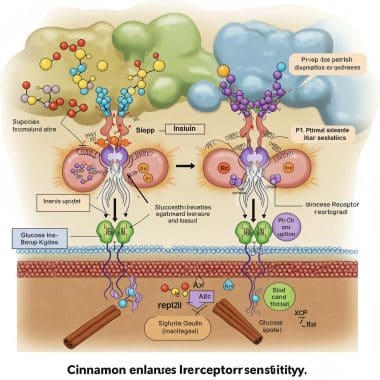A Spice with Healing Potential
While cinnamon has always been a favorite flavor enhancer in kitchens worldwide, recent research has unveiled its unexpected potential as a blood sugar regulator, challenging its traditional role as a mere spice.
With a growing body of evidence, it’s becoming increasingly clear that cinnamon could be a game-changer in the battle against blood sugar levels, especially for those with pre-diabetes. This sweet-smelling spice, often associated with desserts and teas, is emerging as a powerful tool in the global fight against the diabetes epidemic.
The Study That Turned Heads
A 2020 randomized controlled trial published in the Journal of the Endocrine Society shed light on Cinnamon’s remarkable potential. Conducted collaboratively in Korea and at a medical center in Boston, this double-blind, placebo-controlled study enrolled 54 participants aged 20 to 70, all diagnosed with pre-diabetes.
Over the course of 12 weeks, participants were randomly assigned to receive either a placebo or 500 mg of cinnamon extract and powder three times per day. This dosage totaled just over half a teaspoon daily, a small amount with a potentially significant impact.
What the Results Revealed
The results were striking. While participants in the placebo group experienced a measurable rise in fasting plasma glucose, those who consumed Cinnamon maintained stable blood sugar levels throughout the trial.
In addition to fasting glucose, researchers measured responses using an oral glucose tolerance test. They found that the cinnamon group also had reduced area under the curve values, indicating better overall blood sugar management.
A Global Crisis Needs Natural Solutions
This research is especially timely considering the scale of the problem. Pre-diabetes is not just a personal health issue, but a global crisis affecting approximately 500 million people worldwide. In the United States alone, it’s estimated that between 38 to 60 percent of adults may be living with pre-diabetes.
Many remain undiagnosed, increasing their risk of developing full-blown type 2 diabetes and the associated complications such as cardiovascular disease, kidney failure, and vision loss.
How Cinnamon Might Work

What makes Cinnamon particularly compelling is the results and the mechanisms behind them. Researchers propose several plausible explanations for its remarable effects.
One hypothesis is that Cinnamon enhances insulin receptor sensitivity, allowing the body to use insulin more effectively. Another suggests that Cinnamon slows the breakdown of carbohydrates, reducing the glycemic impact of meals.
Additionally, it may directly improve glucose uptake by cells and reduce oxidative stress and inflammation… two key factors in the development of insulin resistance.
Backed by Science and Tradition
These mechanisms are not only theoretical. They align with findings from other studies that support Cinnamon’s anti-inflammatory, antioxidant, and metabolic benefits.
While the 2020 trial focused specifically on glycemic control, previous research has linked Cinnamon to improved cholesterol profiles, reduced markers of inflammation, and even possible anti-cancer properties.
Simple and Delicious Integration
One of the most appealing aspects of incorporating Cinnamon into a health regimen is its ease and enjoyment. You can find a lot of information online on incorporating cinnamon into your daily diet. I even found an excellent idea for a quick cinnamon drink here.
Cinnamon is versatile and widely available, from adding to your morning oatmeal or tea to incorporating it into some pretty tasty dishes. They also emphasized the importance of making healthy habits routine—keeping Cinnamon in a visible, convenient spot in the kitchen can serve as a simple but powerful reminder.
Lifestyle Over Quick Fixes
It’s crucial to remember that while cinnamon can be a valuable addition to your health regimen, it’s not a miracle cure. The researchers and presenters of the study emphasized that no supplement can replace the importance of a balanced diet, regular physical activity, weight management, and stress reduction in diabetes prevention and management.
A balanced diet, regular physical activity, weight management, and stress reduction remain the cornerstones of diabetes prevention and management. While cinnamon can be a valuable adjunct, the researchers and presenters stressed that no supplement can substitute for a healthy lifestyle. It’s important to remember that cinnamon is not a miracle cure, but rather a part of a comprehensive approach to health.
Quality Matters
Furthermore, not all Cinnamon is created equal. The study did not specify whether Ceylon (authentic) Cinnamon was used or the more common Cassia variety. However, Ceylon cinnamon is often recommended for medicinal use due to its lower coumarin content, which can be harmful in extremely high doses.
A Future Rooted in Ancient Wisdom
As more studies like this one emerge, integrating natural compounds into evidence-based medicine becomes increasingly promising. Cinnamon’s ability to support glycemic control could make it a staple in the kitchen and preventive health strategies. And with no reported side effects in the study, it’s a low-risk option for many looking to improve their health naturally.
For anyone interested in reading the original research, the study titled “Influence of Cinnamon on Glycemic Control in Individuals With Pre-diabetes: A Randomized Controlled Trial” is available via the Journal of the Endocrine Society and can be accessed here.
With centuries of culinary tradition, Cinnamon may well find a new identity as a huge therapeutic ally. And, as awareness grows, with modern science continuing to back ancient wisdom, this everyday spice may become an everyday essential in the fight against pre-diabetes.









